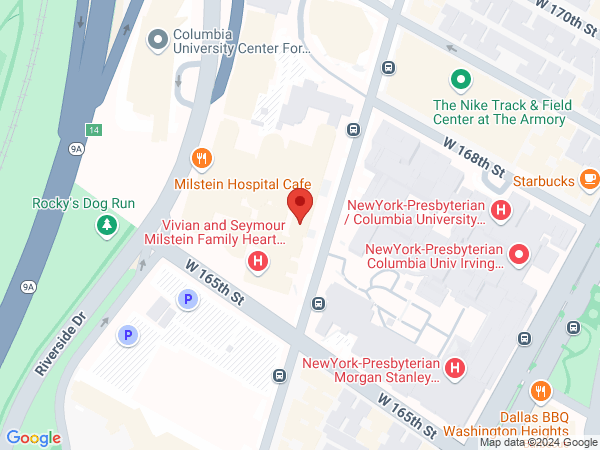Mathew Maurer, MD
Advanced Heart Failure and Transplant Cardiology
Cardiovascular Disease, Internal Medicine
Accepting New Patients
Virtual Visits/Telehealth
On the web

Overview
Mathew S. Maurer, MD - Dr. Maurer is a general internist and geriatric cardiologist with advanced training in heart failure and cardiac transplantation. He is the Arnold and Arlene Goldstein Professor of Cardiology at Columbia University Irving Medical Center, Vagelos College of Physicians & Surgeons, where directs the Clinical Cardiovascular Research Laboratory for the Elderly (CCRLE). Dr. Maurer is a member of the Advanced Cardiac Care Center at NewYork Presbyterian Hospital – Columbia Campus. He is the Director of the Cardiac Amyloidosis Program.
He has published over 300 articles including peer reviewed manuscripts, reviews and book chapters. He was Chair of the American College of Cardiology’s Geriatric Cardiology Member Section, which is the largest organization dedicated to advancing the care of older adults with cardiovascular disease. He was co-chair of the Steering Committee of the ATTR-ACT trial showing tafamidis was a safe and effective therapy for transthyretin amyloid cardiomyopathy. Throughout his career, he has promulgated an approach to older adults with cardiovascular disease that offers the best of both geriatric and cardiovascular medicine in which a comprehensive holistic approach to enhance functional capacity and quality of life is at the forefront of emerging techniques to address cardiovascular physiologic derangement that disproportionately afflict older adults.
He has published over 300 articles including peer reviewed manuscripts, reviews and book chapters. He was Chair of the American College of Cardiology’s Geriatric Cardiology Member Section, which is the largest organization dedicated to advancing the care of older adults with cardiovascular disease. He was co-chair of the Steering Committee of the ATTR-ACT trial showing tafamidis was a safe and effective therapy for transthyretin amyloid cardiomyopathy. Throughout his career, he has promulgated an approach to older adults with cardiovascular disease that offers the best of both geriatric and cardiovascular medicine in which a comprehensive holistic approach to enhance functional capacity and quality of life is at the forefront of emerging techniques to address cardiovascular physiologic derangement that disproportionately afflict older adults.
Areas of Expertise / Conditions Treated
- Adult Cardiology
- Amyloidosis
- Clinical Cardiology
- Geriatric Cardiology
- Heart Failure
- Heart Failure With Preserved Ejection Fraction (HFpEF)
- Hypertrophic Cardiomyopathy
- Left Ventricular Assist Device
- Pulmonary Hypertension
Academic Appointments
- Professor of Medicine at CUMC
Hospital Affiliations
- NewYork-Presbyterian / Columbia University Irving Medical Center
Languages
- Spanish
Gender
- Male
Schedule an Appointment
Virtual Visits/Telehealth
Virtual Visits allow you to connect with your provider from the comfort, convenience, and safety of your own home.
Phone Appointments
New and Existing Patients:
Connect Patient Portal
For existing patients, login to make an appointment, view documentation or contact your care provider.
Location(s)
173 Fort Washington Avenue
Room 617, Floor 4, Suite 617
New York, NY 10032
Primary
Phone:
Insurance Accepted
Aetna
- Aetna Signature Administrators
- EPO
- HMO
- Medicare Managed Care
- NY Signature
- POS
- PPO
- Student Health
Affinity Health Plan
- Essential Plan
- Medicaid Managed Care
Amida Care
- Special Needs
Cigna
- EPO
- Great West (National)
- HMO
- Medicare Managed Care
- POS
- PPO
Emblem/GHI
- Medicare Managed Care
- PPO
Emblem/HIP
- ConnectiCare
- EPO
- Essential Plan
- HMO
- Medicaid Managed Care
- Medicare Managed Care
- POS
- PPO
- Select Care (Exchange)
- Vytra
Empire Blue Cross/Blue Shield
- EPO
- HMO
- Medicare Managed Care
- PPO
Empire Blue Cross Blue Shield HealthPlus
- Child/Family Health Plus
- Essential Plan
- Medicaid Managed Care
Fidelis Care
- Child/Family Health Plus
- Essential Plan
- Medicaid Managed Care
- Medicare Managed Care
Healthfirst
- Child/Family Health Plus
- Leaf (Exchange)
- Medicaid Managed Care
- Medicare Managed Care
Local 1199
- Local 1199
- NYP Employee Plan
MagnaCare (National)
- MagnaCare
Medicare
- Railroad
- Traditional Medicare
Multiplan
- Multiplan
MVP Health Care
- Child/Family Health Plus
- Essential Plan
- HMO
- Medicaid Managed Care
RiverSpring
- Special Needs
UnitedHealthcare
- Columbia University Employee Plan
- Compass (Exchange)
- Empire Plan
- HMO
- Medicaid (Community Plan)
- Medicare Managed Care
- Oxford Freedom
- Oxford HMO
- Oxford Liberty
- POS
- PPO
VNSNY CHOICE
- Medicare Managed Care
- SelectHealth
- Special Needs
WellCare
- Medicaid Managed Care
- Medicare Managed Care
World Trade Center Health Plan
- World Trade Center Health Plan
*Before your appointment, please contact the doctor’s office or your insurance provider to verify that your insurance is accepted. This list of insurances can change, and the insurance plans listed may not be accepted at all office locations for this provider.
Credentials & Experience
Education & Training
- Mount Sinai School of Medicine CUNY
- Internship: NewYork-Presbyterian Hospital/Columbia University Medical Center
- Residency: NewYork-Presbyterian Hospital/Columbia University Medical Center
- Fellowship: NewYork-Presbyterian Hospital/Columbia University Medical Center
Board Certifications
- Cardiovascular Disease
- Advanced Heart Failure and Transplant Cardiology
- Internal Medicine
America's Top Doctor
NY Top Doctor
Research
I am interested in understanding how age related changes in cardiovascular structure and function contribute to cardiovascular disorders that disproportionately afflict the elderly.
